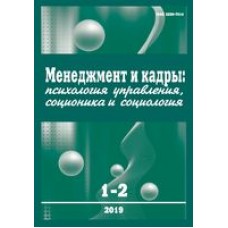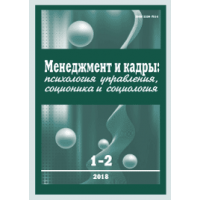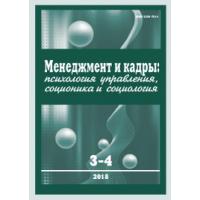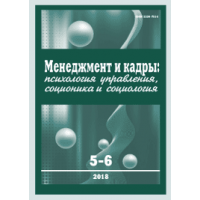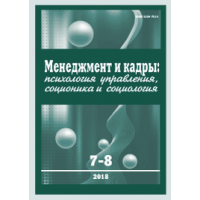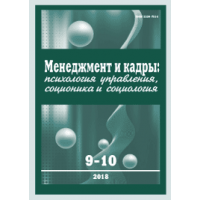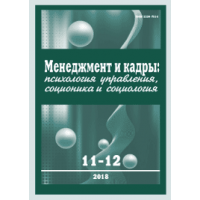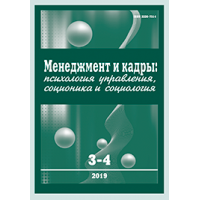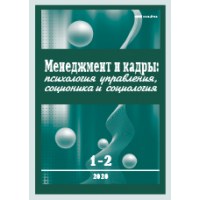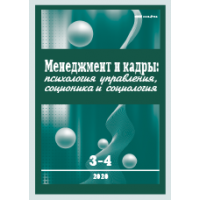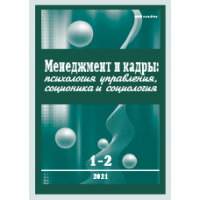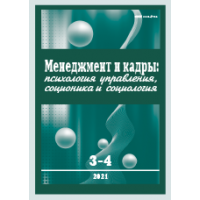Номер № 1-2/2019 журналу «Менеджмент і кадри: психологія управління, соціоніка та соціологія»
Інструменти менеджменту
Карпенко О.Б., Букалов А.В .
Соціонічні типи в управлінні колективами та в різних сферах діяльності
На вибірці 2748 чол. - Співробітників понад 100 підприємств, фірм та організацій різних сфер діяльності вивчено розподіл соціонічних типів на різних рівнях управління. Проведено детальний аналіз, які з ознак Юнга-Рейніна-Аугустінавічюте можуть бути пов'язані з досягненням найвищих рівнів управління. Розглянуто зв'язок між належністю ТІМу співробітника до соціонічної групи: квадри, стимульної групи, темпераментної групи, групи комунікації та рівнем управління, що займає цей співробітник. На прикладі посад «головний інженер», «бухгалтер», «економіст», «інженер-програміст» та ін. простежено кореляцію між соціонічними якостями типів інформаційного метаболізму та специфікою професійної діяльності. Показано, що навіть в одній (фінансово-економічній) сфері діяльності існують певні переваги для різних видів цієї діяльності (у конкретному випадку – для бухгалтерів та економістів). Зроблено висновок, що особливості, властиві різним видам професійної діяльності, можна виразити в термінах соціоніки, а розподіл ТІМів підтверджує об'єктивність відмінностей в інформаційній структурі діяльності.
Ключові слова: тип, рівень управління, професійна сфера діяльності, головний інженер, бухгалтер, економіст, програміст, кар'єрне зростання.
Нові технології
Шлаїна В.М.
Стрес і панічні стани в управлінській діяльності
Розглянуто ситуації, що виникають в управлінській діяльності, які можуть призвести до стресу. Особливу увагу приділено панічним станам, що виникають під час стресу та дезорганізують діяльність менеджерів та організації загалом. Запропоновано рецепти щодо запобігання виникненню таких станів, включаючи елементи психологічних тренінгів.
Ключові слова: менеджмент, персонал, стрес, психологія управління.
Джелалі В.І., Кулініченко В.Л.
Визначальні особливості науки завтрашнього дня
Активна, а тим паче масова науково-технічна діяльність, що проводиться та заснована на базі самодіяльності, ініціативи кожного, потребує постійного інноваційного забезпечення, розвиненої, особистісної та соціальної інноваційної культури. Особистісно-соціальна інноваційна культура відіграє ключову роль у вирішенні всіх трьох базових завдань морального розвитку: активізації лідерів та критичної маси найбільш підготовленої частини населення (вчених та винахідників, педагогів, робітників, підприємців, молоді та літніх, журналістів, політиків) та прискорення включення решти частини в активний творчий процес, їх самоорганізації та матеріально-технічного забезпечення такої діяльності.
Ключові слова: інновації, винаходи, конкуренція, наука, національний розвиток.
Проблеми освіти
Пілікян К.Г.
Психолого-педагогічне забезпечення особистісно-орієнтованої освіти
Особистісно-орієнтована освіта стає можливою лише тоді, коли орієнтація на особистість – не просто абстрактний заклик, позбавлений методів його реалізації та відданий на відкуп учительському прозрінню, а конкретна педагогічна технологія, що спирається на психологічні закономірності. Описано програму для педагогів «Соціоніка як інноваційна технологія».
Ключові слова: соціоніка, типи психіки, міжособистісні відносини, форми інформації, навчання, освіта, педагогічна психологія, педагогічна соціоніка, інноваційні освітні установи , педагог-експериментатор, закономірності розвитку дитини, навчальна мотивація, тип інформаційного метаболізму, сильні та слабкі психологічні функції, особистісно-діловий потенціал педагога. >
Проведено аналіз переваг та недоліків різних методів визначення соціонічного типу.
Ключові слова: соціоніка, типування, ТИМ, тести, діагностика.
Соціонічні портрети
Розова М.Ю.
Особистість Сергія Єсеніна з погляду соціоніки
< Аналізується психологічний портрет поета Сергія Єсеніна. На основі аналізу його віршів та листів за 12-ти ознаками Аугустинавічюте-Рейніна, 4-м малим групам та за всіма 8-ма функціями моделі А зроблено висновок про його приналежність до ТИМу інтуїтивно-етичний інтроверт ( TE).Ключові слова: соціоніка, тип інформаційного метаболізму, діагностика за текстами, ознаки Аугустінавічюте-Рейніна, малі групи, модель А.
Менеджмент і кадри 1-2/2019
- Модель: выпуск журнала «Менеджмент и кадры…»
-
$3.00
- Ціна в бонусних бали: 30
Рекомендовані товари
Менеджмент і кадри 1-2/2018
Номер № 1-2/2018 журналу «Менеджмент і кадри: психологія управління, соціоніка та соціологія&r..
$3.00
Менеджмент і кадри 3-4/2018
Номер № 3-4/2018 журналу «Менеджмент і кадри: психологія управління, соціоніка та соціологія&r..
$3.00
Менеджмент і кадри 5-6/2018
Номер № 5-6/2018 журналу «Менеджмент і кадри: психологія управління, соціоніка та соціологія&r..
$3.00
Менеджмент і кадри 7-8/2018
Номер № 7-8/2018 журналу «Менеджмент і кадри: психологія управління, соціоніка та соціологія&r..
$3.00
Менеджмент і кадри 9-10/2018
Номер № 9-10/2018 журналу «Менеджмент і кадри: психологія управління, соціоніка та соціологія» Нові ..
$3.00
Менеджмент і кадри 11-12/2018
Номер № 11-12/2018 журналу «Менеджмент і кадри: психологія управління, соціоніка та соціологія..
$3.00
Менеджмент і кадри 3-4/2019
Номер № 3-4/2019 журналу «Менеджмент і кадри: психологія управління, соціоніка та соціологія&r..
$3.00
Менеджмент і кадри 1-2/2020
Номер № 1-2/2020 журналу «Менеджмент і кадри: психологія управління, соціоніка та соціологія&r..
$3.00
Менеджмент і кадри 3-4/2020
Номер № 3-4/2020 журналу «Менеджмент і кадри: психологія управління, соціоніка та соціологія&r..
$3.00
Менеджмент і кадри 1-2/2021
Номер № 1-2/2021 журналу «Менеджмент і кадри: психологія управління, соціоніка та соціологія&r..
$6.00
Менеджмент і кадри 3-4/2021
Номер № 3-4/2021 журналу «Менеджмент і кадри: психологія управління, соціоніка та соціологія&r..
$6.00

